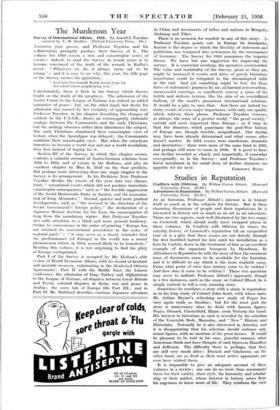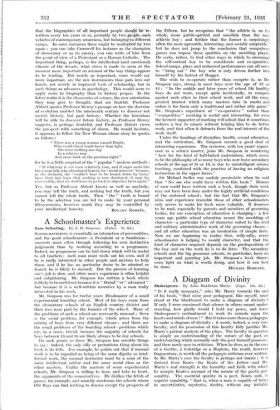Studies in Reputation
Adventures in Reputation. By Wilbur Cortez Abbott. (Harvard University Press. $2.50.) As an historian, Professor. Abbott's interest is in history itself as much as in the subjects for history. But in these charming discussions of people and their reputations he is
interested in history not so much as an art as an adventure. There are two aspects, each well illustrated by his two essays on Cromwell, which should really have swapped places in these volumes. In- Conflicts with Oblivion he traces the varying history of Cromwell's reputation till an unspecified year (it. is a •-pity that these essays are not dated), through
the first horrified hatred for him until his installation as a hero by Carlyle, down to the treatment of him as an excellent example of the rapacious bourgeois by Hyndman. in
Adventures in Reputation he tells the story of how the enormous mass of documents came to be available for the historian,
and it is difficult to say which is the more readable essay. From what point of view does history come to be written ?
And how does, it come to be written ? Those two questions may serve to indicate Professor Abbott's approach, though
in a few instances, such as the essay on Colonel Blood, he is simply content to tell a very amazing story.
Sometimes he combines a story with a study in reputation,
as in his long study of Colonel John Scott, with whose name Mr. .Arthur Bryant's refreshing new study of Pepys has once again made us familiar ; but for the most part the
story is unnecessary since he deals with famous figures, Pepys, Disraeli, Chesterfield, Hume, even Victoria the Good. His interest in historians as such is revealed by his selection of 'the Venerable Bede, Macaulay, and " New " History and Iristorians. NatUrally he is also interested in America, and it is disappointing that his selection should embrace only minor figures, with no mention of the great heroes. It would be pleasant to be told in his easy, graceful manner, what Americans think and have thought of such figures as Hamilton
and Jefferson. The difficulty there is, perhaps, that they
are still very much alive ; Disraeli and Gladstone, on, the other hand, are as dead as their most active opponents can ever have wished them.
It is impossible - to give , an adequate account of these volurnes in a review ; one can do no more than recommend them for their variety, their style, the humanity and scholar- ship of their author, whose 'interest in history arises from
his eagerness to' know more of life. They reinforce the view that the biographies of all important people should ••Wrie- written every ten years or so, probably by two .peoidei-etch
vehicles of contemporary awareness, but belonging-to-different camps. In some instances these might be multiplied -by.two
again ; you can take Cromwell for instance as the champion of democracy or as its enemy, you can. write .of him from the Point of view of a Protestant or a Roman Catholic. The
important thing, perhaps, is the intellectual (and emotional) climate of the decade, what stress is made to seem at the moment more important on account of the way things appear to be tending. But nearly as important, some would say more important, are the new instruments time puts into our hands, not merely in improved tools of scholarship, but in such things as advances in psychology. This would seem to apply more to biography than to history proper. In the latter realm it is the discoveries of science, the new orientation they may give to thought, that are fruitful. Professor _Abbott quotes Professor Dewey's passage on how the doctrine of evolution enabled the nineteenth century to discover not merely history, but past history. Whether the historians will be able to discover future history, as Professor Dewey suggests, is perhaps doubtful, and Professor Abbott views the prospect with something of alarm. He would hesitate, it appears, to follow the New Woman whose story he quotes , as follows : " There was a young woman named Bright, Who could travel much faster than light. Sho went walking one day
In a relative way
And came back on the previous night."
for he is a little sceptical of the " popular " modern methods :
" If relativity is not even relatively true, and if eager souls like the young lady who abandoned history for' social sciences ' because, as she declared, she couldn't bear to be bound down by facts,' have their last hope that nothing is true destroyed, it may be, conceivably, that we shall have to go back to objective facts again."
Yes, but as Professor Abbott knows as well as anybody, you may tell the truth, and nothing but the truth, but you cannot tell the whole truth. Then " the " truth is bound
to be the selection you are led to make by your personal idiosyncrasies, however much they may be controlled by
your intellectual honesty. ' rei; DOBRAE:















































 Previous page
Previous page